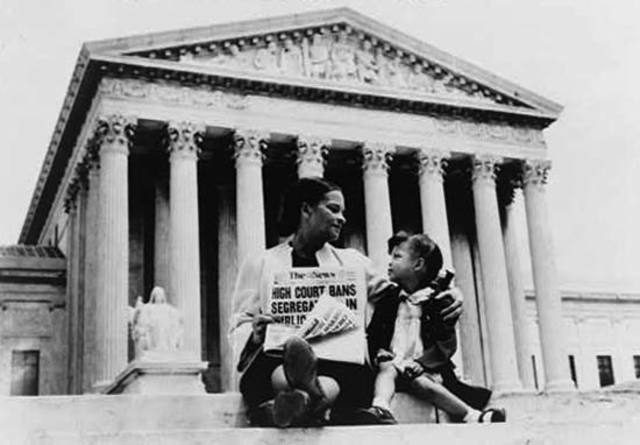Justice Department Action Signals Potential End To Other School Desegregation Orders

Table of Contents
The Justice Department's Shift in Approach to School Desegregation
The Justice Department's (DOJ) approach to school desegregation appears to be undergoing a significant shift. This change isn't marked by a single, sweeping policy change, but rather a series of actions indicating a decreased commitment to enforcing existing desegregation orders and preventing new instances of segregation.
- Examples of changed approach: In several recent cases, the DOJ has chosen not to intervene in lawsuits challenging desegregation plans, even when evidence suggests a return to racially imbalanced schools. For instance, [cite specific example, if available, with link]. In other instances, the DOJ has actively supported arguments against maintaining desegregation efforts, a stark contrast to its historical role. [cite specific example, if available, with link].
- Statements and Press Releases: While there hasn't been a formal announcement declaring a new policy, the DOJ's actions speak louder than words. The lack of public statements defending its previous commitment to school desegregation can be interpreted as a tacit endorsement of a more lenient approach.
- Motivations: This shift in policy is likely driven by a confluence of factors, including political pressure from administrations resistant to affirmative action and legal challenges arguing that desegregation orders are outdated or infringe on local control.
Potential Impact on Existing School Desegregation Orders
This change in the DOJ's stance has profound implications for school districts currently operating under court-ordered desegregation plans. These plans, often the result of decades-long legal battles, aim to create racially integrated schools. The DOJ's reduced involvement could embolden school districts to seek the termination of these plans.
- Affected School Districts: Numerous school districts across the country, particularly in the South and other historically segregated areas, could see their desegregation plans weakened or overturned. [If possible, cite specific examples of districts at risk]. The potential consequences for students in these districts are severe, potentially leading to re-segregation.
- Legal Mechanisms: School districts may use various legal tactics to challenge existing orders, arguing that desegregation goals have been met or that the plans are no longer necessary or feasible. This could involve appeals to higher courts or lobbying for legislative changes.
- Increased Racial Segregation: The most concerning consequence is the potential for a significant increase in racial segregation in affected schools. This would perpetuate the educational inequalities that desegregation orders were intended to address.
The Broader Implications for Educational Equity
The potential unraveling of school desegregation orders has far-reaching consequences for educational equity and undermines the landmark Brown v. Board of Education Supreme Court decision of 1954, which declared state laws establishing separate public schools for black and white students to be unconstitutional.
- Historical Context: Brown v. Board marked a pivotal moment in the fight for civil rights. The decision recognized that segregation inherently creates unequal educational opportunities.
- Resurgence of De Facto Segregation: Even with the legal dismantling of de jure (by law) segregation, de facto (in fact) segregation persists through housing patterns, school district boundaries, and other factors. Weakening desegregation orders could exacerbate this existing de facto segregation.
- Impact on Academic Achievement and Social Mobility: Studies consistently demonstrate that racially integrated schools benefit minority students academically and socially. Increased segregation could negatively impact academic achievement, college enrollment, and long-term social mobility for minority students.
Public Response and Future Legal Challenges
The Justice Department's shift has drawn criticism from numerous civil rights organizations, educators, and policymakers concerned about the implications for educational equity.
- Ongoing Legal Challenges: Civil rights groups are likely to mount legal challenges to any attempts to overturn desegregation orders, arguing that they violate the Constitution and harm minority students.
- Legislative Responses: There could be legislative action at the state and federal levels to either reinforce or counteract the DOJ’s approach. This may involve legislation aimed at protecting or expanding desegregation efforts.
- Public Opinion and Activism: Public opinion and activism will play a crucial role in shaping future developments. Public pressure could influence legislative action and judicial decisions.
Conclusion
The Justice Department's apparent shift away from enforcing school desegregation orders represents a serious threat to educational equity in the United States. This could lead to increased racial segregation in schools, undermining decades of progress and the principles established by Brown v. Board of Education. The potential consequences for minority students are significant, potentially impacting their academic achievement and social mobility. The ongoing legal battles and public response will determine the ultimate impact of this shift. Stay informed about developments related to school desegregation and engage in efforts to promote educational equality for all students. Continue to monitor the Justice Department's actions regarding school desegregation and advocate for policies that uphold the principles of Brown v. Board of Education. Learn more about the ongoing fight for school desegregation and how you can contribute to ensuring equitable access to education for all children.

Featured Posts
-
 Riot Fest 2025 Green Day And Weezer Lead The Charge
May 02, 2025
Riot Fest 2025 Green Day And Weezer Lead The Charge
May 02, 2025 -
 Remembering A Life Cut Short Tributes For 10 Year Old Rugby Player
May 02, 2025
Remembering A Life Cut Short Tributes For 10 Year Old Rugby Player
May 02, 2025 -
 Manchester United Pays Tribute To Poppy Atkinson 10 Killed In Kendal Pitch Accident
May 02, 2025
Manchester United Pays Tribute To Poppy Atkinson 10 Killed In Kendal Pitch Accident
May 02, 2025 -
 Rosie Huntington Whiteleys Ethereal Lingerie A Stunning Look
May 02, 2025
Rosie Huntington Whiteleys Ethereal Lingerie A Stunning Look
May 02, 2025 -
 2027
May 02, 2025
2027
May 02, 2025
